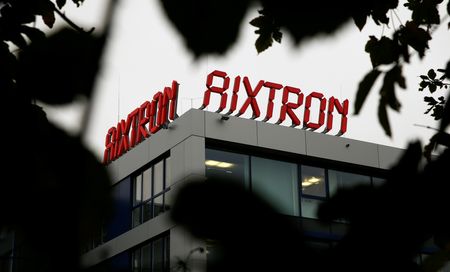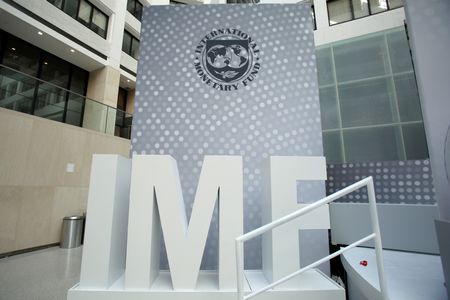By Michael Kahn and Anna Koper
PRAGUE/WARSAW (Reuters) -A growing wave of bankruptcies in Germany’s stuttering economy is spurring Czech and Polish businesses to snap up struggling companies across the border to fuel expansion into Europe’s largest market and beyond.
The trend underlines how, three decades after the fall of the Berlin Wall, the companies of ex-communist central Europe are often leaner and more agile than German “Mittelstand” peers whose baby-boomer owners are now hitting retirement age.
Czech producer of fruit brandies R. Jelinek earlier this year bought Berlin’s largest artisan distiller BLN to strengthen its position in the German market and gain access to big grocery chains like REWE and Edeka.
“Our main driver was to enter the key market through the acquisition of a local brand and personnel with German market expertise,” R. Jelinek Vice Chairman Zdenek Chromy told Reuters.
“The economic cycle has naturally created a need for consolidation which has opened up opportunities,” he said of a German economy suffering its longest downturn since World War Two and with bankruptcies up over 9% in early 2025.
These small and medium-sized businesses, thousands of which are planning to shut down by the end of the year, are part of the 99% of German firms known as the Mittelstand. Often family-run, many are hitting a demographic wall as the children of their ageing owners have no interest in taking over.
“In a period of economic weakness and in light of many unresolved company successions, there are entry opportunities into the German market,” Marc Tenbieg, president of the Mittelstand association, told Reuters.
Reuters spoke to more than a dozen economists, analysts and companies to shed light on how Czech and Polish businesses are using their financial strength to plant a foothold in Germany, especially in manufacturing, logistics and export-driven sectors.
Not only are German corporate valuations being weakened by the stagnating growth rates of the wider economy, Czech and Polish firms are also benefiting from ample liquidity and a period of relatively low borrowing costs.
“Germany is relatively ‘cheaper’ today … which increases the attractiveness of assets to foreign buyers, including those from Poland,” Lukasz Chrabanski, head of the Polish Investment and Trade Agency foreign office in Frankfurt told Reuters.
While precise data highlighting the trend are scarce, the latest figures from Germany’s Bundesbank show Czech investments in Germany soared nearly 30% to almost 5 billion euros in 2023. Six takeovers of German entities by Polish companies have been notified since the start of this year, up from two deals in the whole of 2024, the data by Navigator Capital showed.
CZECHS, POLES READY FOR EXPANSION
Petr Kozel, the owner of Czech cargo company VCHD, told Reuters the time was ripe for his business to expand operations in Germany, where it sees few new local players entering the market while existing ones struggle with succession problems.
“Medium-sized companies with lean structures and direct owners who can make quick and long-term decisions are now at an advantage,” he said.
Many of the Czech and Polish businesses scouting for opportunities in Germany set up shop in the early 1990s following the fall of communism and have now matured to the point where they need to look beyond their borders.
They can also source services back home where labour costs are often lower while injecting more nimble management structures into family-owned businesses, the companies and economists say.
“Germany has always been a big brother for us with German companies mainly only coming to Czechia,” Adam Jares, director of Germany for the Czech government’s CzechTrade office, told Reuters.
“Nowadays Czech companies are at the point where they have had 25-30 years to build the business and are now ready for further growth.”
For Czech and Polish companies looking to take a bite out of Europe’s largest market, the small and medium-sized enterprises just across the border make sense, given they account for half of Germany’s economic output and nearly 60% of jobs.
Szymon Bartkowiak, the chief executive of Polish firm TT PSC, said its 2025 deal for German information technology provider x-Info Wieland Sacher had already yielded a flurry of new contracts.
The purchase announced this year by Polish waste management company Grupa Recykl of Germany’s HRV is also a win-win, the CEO of the Polish company said: Grupa Recykl will gain better access to a market nearly three times bigger than its home market while it will give HRV access to a financially-strong international partner.
A survey by German state-run development bank KfW showed around 231,000 SME owners plan to close their doors by the end of this year – 67,500 more than a year ago — providing plenty of choices for cash-rich Czech and Polish companies.
“In my view, for the Czech firms, there’s a three or five-year window of opportunity to acquire stakes in German companies,” ING Chief Economist David Havrlant told Reuters.
(Additional reporting by Gergely Szakacs in Budapest and Maria Martinez in Berlin, Editing by Mark John and Toby Chopra)










